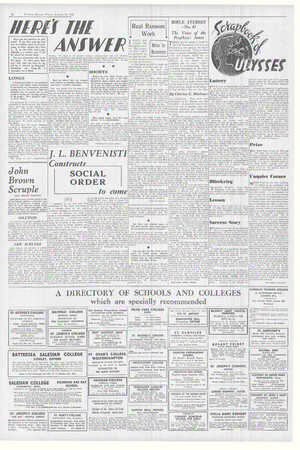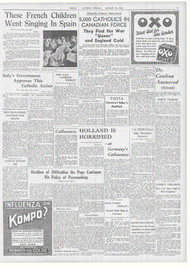Page 8, 26th January 1940
Page 8

Report an error
Noticed an error on this page?If you've noticed an error in this article please click here to report it.
Tags
Share
Related articles
Bible Studies —no. Jo
Bible Studies —no. 46 Lamentations And Baruch
Bible Studies —no. 12 The Minor Prophets
Moses The Scribe, Or Imposter
How To Read The Old Testament Properly
BIBLE STUDIES —No. 41 The Voice of the Prophets: Amos
THERE are 16 prophetic books in the Old Testament, and they are divided into two groups; the major and minor prophets. There are four major prophets, including Lamentations and Baruch, which are an appendix to Jcremias. These arc followed by the twelve minor prophets, but the word " minor" must not be misunderstood. There is nothing derogatory in the term ; it does not mean of lesser importance or secondary authority. It means only " lesser in. bulk "—they are shorter books, hut as St. Jerome says '' Packed within a single volume they signify something far other than the sound of their words would imply." If they are brief, they are also pithy
By Charles G. Mortimer
and significant. They teem with references to the Messias and His Kingdom. As we read them we feel that the veil is wearing very thin between prophecy and fulfilment, between faith and its consummation in sight.
The Old Testament prophets are not arranged in chronological order, so in dealing with this large section of the Old Testament we must abandon our previous method of taking the books in the order given and try to expound the prophetic teaching us it developed in historic sequence. But what is the chronological order? Here is a very disputed subject, and tentatively one might arrange the prophets thus: In the first period—the Assyrian or pre-exilic—Jonas, Amos, Osee (Hosea), Isaias, Abdias, Joel, Micheas and Nahum.
In the period of the Captivity: Habacuc, Jeremias, Sophonias and Ezechiel.
And lastly, post-exilic : Aggeus (Haggai), Zacharias and Malachias.
The whole period of prophecy extends from about 800 tee. or earlier to 450 B.C., but modern critics, even those of a conservative tendency, are not agreed at all about the traditional dates, Jonas, for instance, where does ho belong? Or Joel? Or Isaias? For it is urged that in the single book of Isaias two prophets are really embraced, the latter belonging to the period of the Restoration from exile (from ch. 40). But against that latter view Catholic scholars still contend, and their opinions will be given when we revert to this book.
We may take Amos as the first of the canonical Prophets and start with some account of his writings. It was his mission to address and warn a prosperous community, for under Jeroboam II life was proceeding very pleasantly in the northern province. But Amos saw its dangers; this new accumulation of wealth was but a screen behind which there was a social inequality and an undercurrent of cruelty. But Amos claimed a far deeper insight into the real issues of the period through the special revelation he had received. (See ch. 7 and foil.) " These things the Lord shewed me." His mission must have proved exceedingly unpopular,because he speaks of a coming judgment upon the race. Why? Because religion was deteriorating Into formalism; moral values were being overlooked. His teaching reminds one of the Syllabus of a certain Pope who foresaw far back in the nineteenth century the rottenness of social conditions in a glittering and externally peaceful epoch. Would that his voice had been heeded, for to-day we reap the whirlwind. . . .
Amos taught that all belongs to God; He is the Supreme controller of the whole world order; and secondly, "Jehovah is righteous " and deals with all nations on the same moral basis.
Here is indeed teaching for our own day. How often you will hear men speaking as if Providence had long since abdicated before the onslaughts of modern man in his pride and greed! And how often we still need to remind ourselves that the souls of our enemies are just as precious to Christ as our own; the same moral order, the same spiritual gifts are open to all, must be sought by all, and so indeed We must pray for those who persecute us. God has forged the links that bind us all; it is for us to rediscover them.
Next week: Hosea (Osee).
blog comments powered by Disqus











